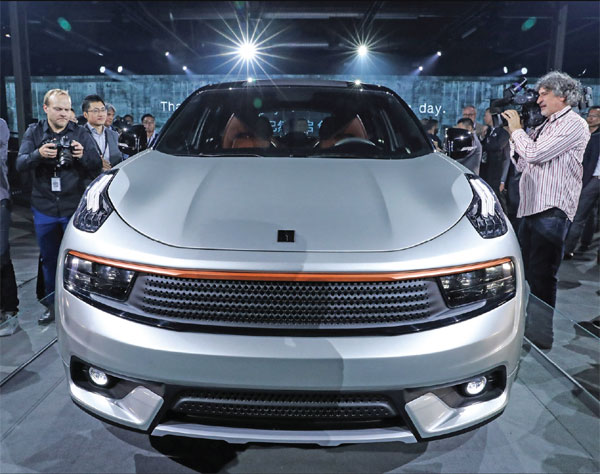Carmakers backed in bid to 'go global'
Chinese brands look two steps ahead of the competition as they make their moves into international markets
To further boost China's economy, the authorities are nurturing the domestic auto industry's expansion in international markets with supportive measures to enhance their competitive edge, according to industry insiders.
There has been a recent series of investment deals involving Chinese and overseas auto companies, including three mergers and acquisitions involving Zhejiang Geely Holding Group and Key Safety System's takeover of Japan's Takata.
Industrial data show that the overall value of such deals exceeded $5 billion in the first half of this year.
|
Geely's concept car at an exhibition in Berlin. Zhejiang Geely Holding Group's acquisition of Terrafugia, meanwhile, is a bet on the profitable future of the currently fictional flying-car business. Shan Yuqi / Xinhua |
Senior consultants at global companies share the opinion that the government is backing the country's automakers' bid to "go global", with action taken to speed up development in the world's largest car market.
"The country is giving support rather than creating constraining factors in order to nurture the industry. It is among the prioritized sectors that help boost the entire economy," says Shu Chang, a partner of German firm Roland Berger Strategy Consultants.
"A couple of years ago, for every 1 yuan (15 cents; 0.13 euros; 12p) in value the local automobile industry generated, the country saw 8 yuan added to its GDP. Also, the industry is creating a large number of job opportunities along the value chain, both within the carmakers and their suppliers," Shu says.
Deloitte Consulting (Shanghai)'s automotive industry partner Marco Hecker says the government is helping local carmakers to accelerate their growth rates, for example by uniting authorities' departments in order to make decisions more quickly.
Wang Xia, chairman of the automotive committee of the China Council for the Promotion of International Trade, said in June: "Chinese carmakers should focus on their fields of expertise and continue to integrate the best resources from all over the world."
Today, Chinese automakers' international footprints tend to reflect proactive action, with their eyes firmly focused on their next steps, instead of simply acquiring technologies.
Key Safety System's takeover of scandal-stricken airbag maker Takata is viewed across the industry not only as a step toward upgrading production, but also a bid to break into the Japanese-dominated airbag sector.
Similarly, Zhejiang Geely Holding is ready to make a name for itself in the Southeast Asian market through buying into Proton and Lotus.
Zhejiang Geely's 100 percent acquisition of Terrafugia, a flying-car startup based in the United States, is a bet on the profitable future of the currently fictional business.
Shu at Roland Berger says Chinese automakers are preparing for the future, aiming to get ahead of the competition through M&A activity overseas, for example expanding into the new energy vehicle and autonomous driving fields.
He says: "It's a more reasonable strategy to buy into the Silicon Valley companies that are working on new energy and autonomous driving vehicles. Electric cars and automated vehicles will be the mainstream within the coming five years.
"In this way, Chinese carmakers will lay solid foundations for next-generation vehicles. They could take a leading position in the world, as the nation has come to expect."
Michael Hawes, chief executive of the Society of Motor Manufacturers and Traders in the United Kingdom, says the market is shifting swiftly toward autonomous vehicles and new energy vehicles, especially in China.
He adds that Chinese carmakers need to overcome barriers to entry before establishing a presence in a market, giving MG as an example.
SAIC Motors now owns the British brand MG, so it has gained instant access to the European market after the deal, Hawes says. Now, MG badges are attached to the vehicles to be exported to many European countries, according to Hawes.
Thanks to MG's local expertise, SAIC understands that the market prefers hatchbacks, not the Chinese favorite sedan models, he adds.
However, Chinese companies still have to be very careful in their overseas M&A activity, especially regarding intellectual property aspects, and need to make it clear for both sides what will be shared, or not shared, according to Hawes.
haoyan@chinadaily.com.cn



















